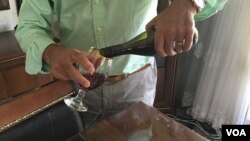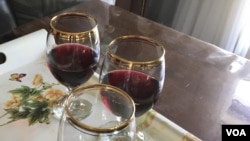Nabaz* carefully poured the red wine into one glass, then another, set the bottle down gently and smiled.
He looked around the small living room with the wide glass windows overlooking the city, and at the small group of guests he had never met, and offered them his wine.
It was the first time Nabaz had personally introduced his homemade production.
“I was a little anxious to see the reaction,” he said later. “Obviously, this to me is a work of art, and art all depends on how people see it and evaluate it.”
As the guests started to roll the red wine in their glasses and sip it, his worries began to disappear.
“Very fruity,” said one guest, Sara. “With quite an alcohol kick,” she added.
“It’s a mellow wine, very usable,” added another guest, Stephen.
For Nabaz, the small informal wine tasting was more than just judging the wine. It was, to a certain extent, a triumph.
“I felt that this was extending a hand of friendship, of offering something unique from Kurdistan, and offering something for the very first time by Iraqi Kurdistan to the outside world,” he said.
The backstory
Nabaz had graduated as a civil engineer when Iraqi Kurdistan came under attack by then-Iraqi leader Saddam Hussein. It was during the 1980-88 Iran-Iraq war, and some Kurdish militants had sided with Iran against the dictator.
Saddam retaliated by dropping chemical weapons on Iraq’s Kurds, killing thousands in the Kurdish city of Halabja, then launched a seven-month offensive in which an estimated 50,000-100,000 Kurdish villagers were killed or disappeared.
Nabaz left everything behind and joined the Iraqi Kurdish fighters known as peshmerga in the mountains to fight against Saddam.
“Even today I believe it was a just cause to sacrifice for, I had no doubt that what was happening was wrong. What Saddam was doing was beyond comprehension,” Nabaz recalled.
On a quiet afternoon a few weeks before the tasting event, Nabaz had spread out old photographs of himself on his dining room table: black and white snapshots of another life. He had longish brown hair then, and a full moustache - all gone now.
“I was a civil engineer with a life in front of me, but nothing was as valuable as to be on the mountain,” he said. “We were friendless at the time; we were on our own. If we didn’t fight, who would?”
‘The most meaningful period of my life’
For eight years, Nabaz stayed in the mountains.
“It was the most meaningful period of my life,” he said.
It was during that time that he noticed that his native land produced grapes, a lot of grapes. Most were used to make juice or raisins.
But wine?
“I love wine myself. So I thought this is an advantage, let’s explore it,” he said.
For the last six years, Nabaz has been experimenting, using different grapes, fermentation processes, tasting, adjusting. Now he has his own wine: “21 Rays”, named for the rays on the Kurdish flag and the sun that shines intensely on the region.
He has had contacts take the wine to London, and said it received favorable reviews there.
“So far, whoever has tasted it, they always say it is a unique taste, and I am so glad about this, because that was my purpose,” he said.
Clandestine operation
But in Kurdistan “21 Rays” is a secret.
The wine is not available in stores. The grape growers don’t even know their grapes are being used for wine. When Nabaz buys the grapes, he does so in small quantities, bringing them to his land in his car or a small pick-up truck. Sometimes he buys the grapes through intermediaries. No one except his immediate family is involved in the making.
Even the guests at the small wine tasting were carefully chosen.
This is the art of secretly making wine, then remaining anonymous.
But why? Imported wine is actually openly sold in Kurdistan, but only in the Christian neighborhoods and by Christians.
But Nabaz is by culture a Muslim, and even if he doesn’t subscribe to every tenet of Islam, many in Iraq’s conservative Kurdish society do. For observant Muslims, the making, selling and drinking of wine is forbidden.
Even some members of his extended family, if they knew, would not approve.
Respect is keeping Nabaz from going public. But so is fear.
“Daesh is only a few tens of kilometers away,” Nabaz said, using the local name for Islamic State extremists who are less than an hour's drive away. “One has to be discreet.”
So even though most of the guests at the tasting bought one or two bottles to take back to their homes, and one guest ordered another four, Nabaz seemed a little lost as to what to do next.
“It’s very hard,” he said. “I don’t know, really.”
Nabaz has plans to produce more wine in the upcoming harvest, but no more than a few hundred bottles, because nothing is mechanized - his close family members are the ones he trusts to take the grapes and stomp them.
So for now, “21 Rays” will remain a Kurdish secret, known only to the chosen few.
* “Nabaz” is not the subject’s real name. It has been changed at his request due to security considerations.






